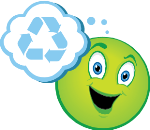Take a look at how long it takes things to decompose including that pop bottle:
| How Long Until It’s Gone? | |
|---|---|
| Glass bottle | 1 million years |
| Monofilament fishing line | 600 years |
| Plastic beverage bottle | 450 years |
| Disposable diapers | 450 years |
| Aluminum cans | 80-200 years |
| Foamed plastic buoy | 80 years |
| Tin can | 50 years |
| Leather | 50 years |
| Nylon fabric | 30-40 years |
| Plastic film canister | 20-30 years |
| Plastic bag | 10-20 years |
| Cigarette filter | 1-5 years |
| Wool sock | 1-5 years |
| Plywood | 1-3 years |
| Waxed milk carton | 3 months |
| Apple core | 2 months |
| Newspaper | 6 weeks |
| Orange or banana peel | 2-5 weeks |
| Paper towel | 2-4 weeks |
| Sources: U.S. National Park Service; Mote Marine Lab, Sarasota, FL and “Garbage In, Garbage Out.” Audobon magazine, Sept/Oct 1998. | |
Roughly 22 million tons of plastic ends up in the Great Lakes each year, and it never really goes away. Think about how much of that plastic could have been kept out of the water if it would have been reduced, reused or recycled.
Here are some things to think about:
1. Can it be reused?
Lots of times we throw away items that can still be used. For example, an old peanut butter jar can be used to hold small toys, or a soup can works great as a pencil cup. If you’ve only written on one side of a piece of paper, save it to use the back side for scrap paper. Your old winter coat might not fit you anymore, but it might still be useful to someone else, like a younger cousin or the neighbor kid.
![]()
Be creative! Here are some fun ideas from Kinder Art of things you can make with items you might otherwise throw away – ART RECYCLED
2. Can it be recycled?
Recycling means to process an old product into a new one. For example, when you return an aluminum pop can to the store, the can gets melted down and a new can is made out of the metal. Many materials, including glass, plastic, paper, and metal can be recycled, saving energy and creating less waste for landfills.
Visit the Keep America Beautiful’s recycling journey to follow the journey of an aluminum pop bottle, or can on its way to be recycled.
3. Can it be composted?
Composting is nature’s recycling system. Organic materials (items made out of things that were once living, such as plants) can be piled together and left to decompose (to break down with the help of microorganisms). Over time, items you once recognized, such as banana peels, apple cores, newspaper, or leaves will transform into a black, soil-like substance called humus. This humus contains lots of nutrients and can be mixed into your garden to help new plants grow healthy and strong. By composting, we not only keep lots of smelly, soggy garbage out of the landfill, but we create something that is valuable and truly useful out of what would have been wasted.

